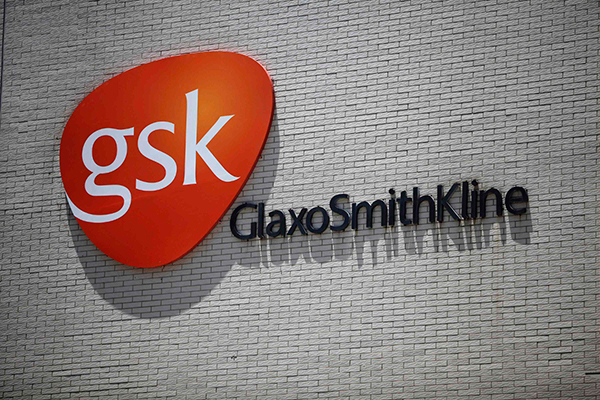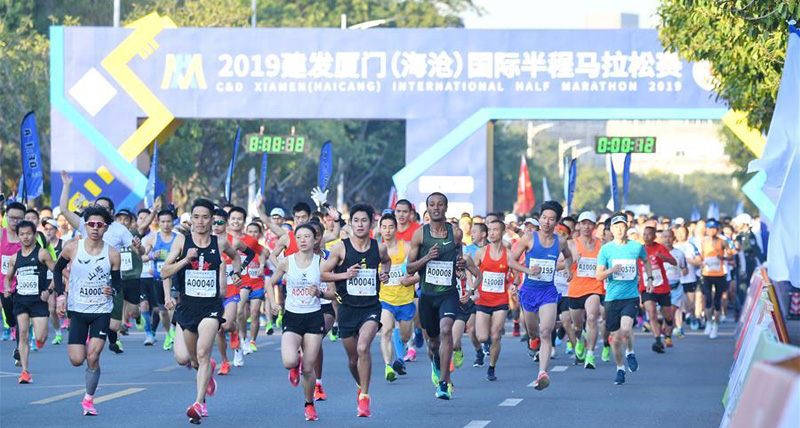GSK, INNOVAX and Xiamen University to jointly develop cervical cancer vaccine
Xinhua| Updated: Sep 11, 2019

The logo of GlaxoSmithKline (GSK) is seen on its office building in Shanghai. [Photo/Agencies]
BRUSSELS - INNOVAX, a subsidiary of China's YangShengTang Group, and Xiamen University signed a global alliance partnership agreement on Friday with British pharmaceutical giant GlaxoSmithKline (GSK) in Wavre, Belgium, to develop a next-generation vaccine against human papillomavirus (HPV).
Zhong Shanshan, chairman of YangShengTang Group, announced this in an interview with Xinhua.
This vaccine will combine the innovative antigen detection method developed by Prof Xia Ningshao's team at Xiamen University, with GSK's proprietary adjuvant AS04, which leverages this antigen technology.
Shazia Sheikh, director of public affairs for global and emerging markets at GSK Vaccine, confirmed the news via email on Friday.
Zhong stressed that this is the first time a Chinese vaccine company, by leveraging its original technology, has entered into a partnership with a world leading vaccine company to co-develop and ultimately commercialize an important vaccine globally. This alliance shows that China's vaccine technology has been highly regarded by its international counterparts. And the partnership is an exemplary collaboration between the pharmaceutical industries of China and Europe.
Zhang Rong, president of Xiamen University, told Xinhua that biological research at Xiamen University has a history of nearly one hundred years. Making scientific and technological achievements that are beneficial to human health and wellbeing and promoting their commercialization is consistent with the University's mission.
"This partnership is a milestone in the past 20 years of industry-research collaboration between INNOVAX and Xiamen University. It is also a commercial cooperation between a Chinese vaccine company and a global vaccine company from Europe. But, above all, it is a model of how the international academic and industrial community can join hands to fight human diseases," he added.
Under the agreement, INNOVAX will build a vaccine production line in Xiamen, Southeast China, that will comply with the standards set by China, the United States, the European Union and the World Health Organization. It will produce and provide to GSK various types of HPV vaccine antigens, which will then be combined with GSK's patented AS04 adjuvant to develop new HPV vaccines for worldwide commercialization, including in Europe and the United States.
GSK said the partnership with INNOVAX will accelerate the development of the next generation of its cervical cancer vaccine.
According to Zhong, the antigen technology was born in the joint biopharmaceuticals laboratory of Xiamen University and YangShengTang led by Professor Xia. It successfully used DNA recombination technology to express proteins in E coli and used it for vaccine production. INNOVAX's cervical cancer vaccine is highly effective in that it protects more HPV types with fewer virus-like particles (VLPs).
The bivalent cervical cancer vaccine co-developed by INNOVAX and Prof. Xia's team is the first Chinese cervical cancer vaccine that has completed the Phase III clinical trial. Commercialization of this vaccine will make China the world's third country with the ability to independently manufacture cervical cancer vaccines after the US and the UK. GSK accelerated partnership talks between the two parties in November, 2018, when INNOVAX's Phase III clinical trial data on cervical cancer vaccine were released.
The cervical cancer vaccine has broad market prospects globally. Cervical cancer is the third most common cancer in women. It is estimated that every year 311,365 women are killed and in every two minutes, a woman will die of cervical cancer. Almost all cases of cervical cancer are caused by the human papillomavirus (HPV). Over 100 types of HPV virus are known, and over 15 of them can cause cervical cancer.



 play
play